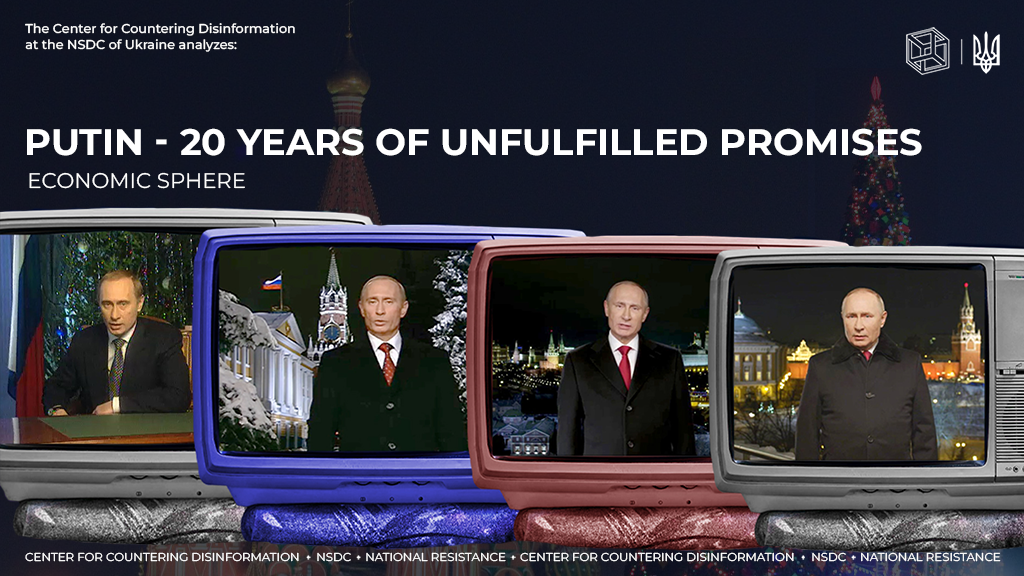Each of putin’s presidential campaigns has been accompanied by his speeches at the «united russia» congress with plans that he and his party intend to implement in the coming years.
In particular, among the promises in the field of economy, in one interpretation or another, it was essential to achieve economic growth rates of up to 6-7% per year and to enter the top five largest economies in the world.
These speeches became putin’s official program for all terms of his ruling. But did he manage to do it?
🔸 A promise. At the end of December 1999, the then prime minister putin impressed russians with the country’s confidence to enter the world’s five largest economies. «In order to achieve GDP production at the level of modern Portugal or Spain, we will need about 15 years at a GDP growth rate of at least 8% per year». This ambitious statement by the soon-to-be Acting President of russia got the mocking nickname «catch up with Portugal» among journalists.
🔻 Actually. The rate of GDP growth, which would allow to catch up with Portugal in 15 years, was registered in russia only once – in 2000, over 8% – in 2007 and 2008 (World Bank Data). The record quarterly decline in GDP by 12.2% was in 2009 after the global financial crisis. After the annexation of Crimea and the first wave of sanctions caused by it, the economy shrank by a maximum of 3.1% (2015). According to S&P Global Market Intelligence experts, russia’s GDP will fall by 11.1% in 2022. Countries that have imposed sanctions account for 56% of russian exports, which puts 15% of GDP at risk. At this rate, the russian economy will need at least 10 years to return to the level of at least 2021 under sanctions. The russian invasion of Ukraine set the russian economy back four years just one quarter after the attack. Correcting the situation by raising taxes threatens a social explosion — the population simply has no money.
🔸 In 2009, putin admitted that there is a huge gap between the rich and the poor in russia, and promised to work to reduce it: «The gap between those with large incomes and those with minimal income is very large here. We will definitely work on it».
🔻 Actually. According to the latest report by the analytical company Credit Suisse, the income inequality of russians remains the highest among the world’s key economies. In 2000, 54% of the country’s national wealth was concentrated in the hands of 1% of citizens, in 2016 they owned a record 65% of wealth, and in 2020 – 57%.
🔸 A promise. In 2007, putin said: «We must strive for the growth of the middle class. You need to do this constantly. And we will definitely do it in the future».
🔻 Actually. In March 2020, putin stated that 70% of russian citizens belong to the middle class, because they earn more than 17 thousand rubles. In fact, only those whose income is at least 25% higher than the median salary in the region are included in the middle class. In 2020, the median salary across russia is 35,000 rubles. This means that half of russians earn more, and the other half less than this amount. Experts claim that the middle class in the country hasn’t grown. According to the Institute of Sociology of the russian Academy of Sciences, in 2006, 20–22% of russians belonged to the middle class. According to a study by NSU HSE, in 2019, 24% of russians belonged to the middle class — slightly more than at the beginning of the zero years. However, in 2020, due to the pandemic, 6% of them moved into the category of poor.
🔸 Promise: «Over the next 10 years, we will double the volume of road construction in the country» (2011).
🔻 Actually. In 2012–2015, investments in the transport sector fell by 27.3%, including railway transport – by 34.3%, road (bus) – by 50.8%. In 2011, 93 km of new railway lines were introduced, then in 2015 – only 18 km. The degree of wear and tear of fixed assets in general in transport increased from 34.7% in 2011 to 41.1% in 2015, including the railway – from 30.4 to 36.3%, the bus – from 55.3 to 59.2%. According to the Ministry of Internal Affairs, bad roads caused 40% of traffic accidents that occurred in russia in 2017.
❗️ As we can see, putin’s main promises remained unfulfilled. As a result of russia’s full-scale invasion of Ukraine, the level of russia’s economy and budget fell to the level that reasoning about its presence among the more or less developed countries of the world became meaningless. The russian economy is paralyzed by sanctions, gas consumption in Europe is decreasing, and putin is criticized even by his closest top associates.
To be continued…










